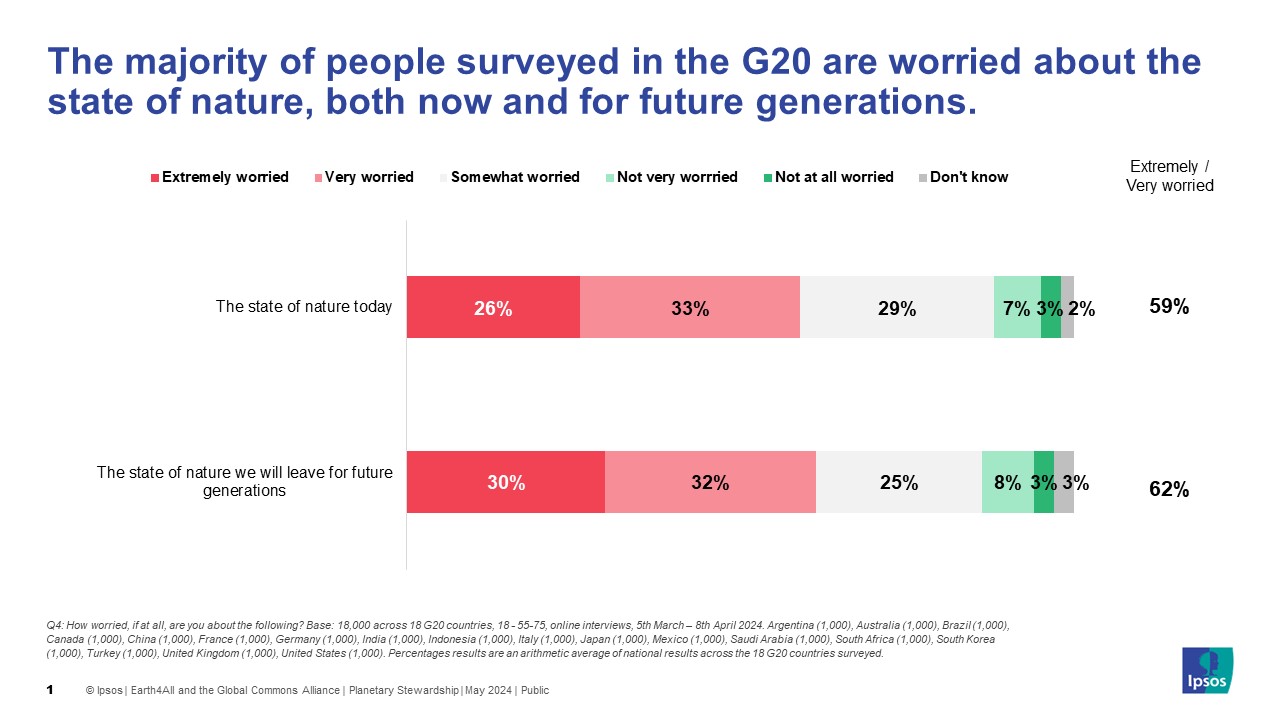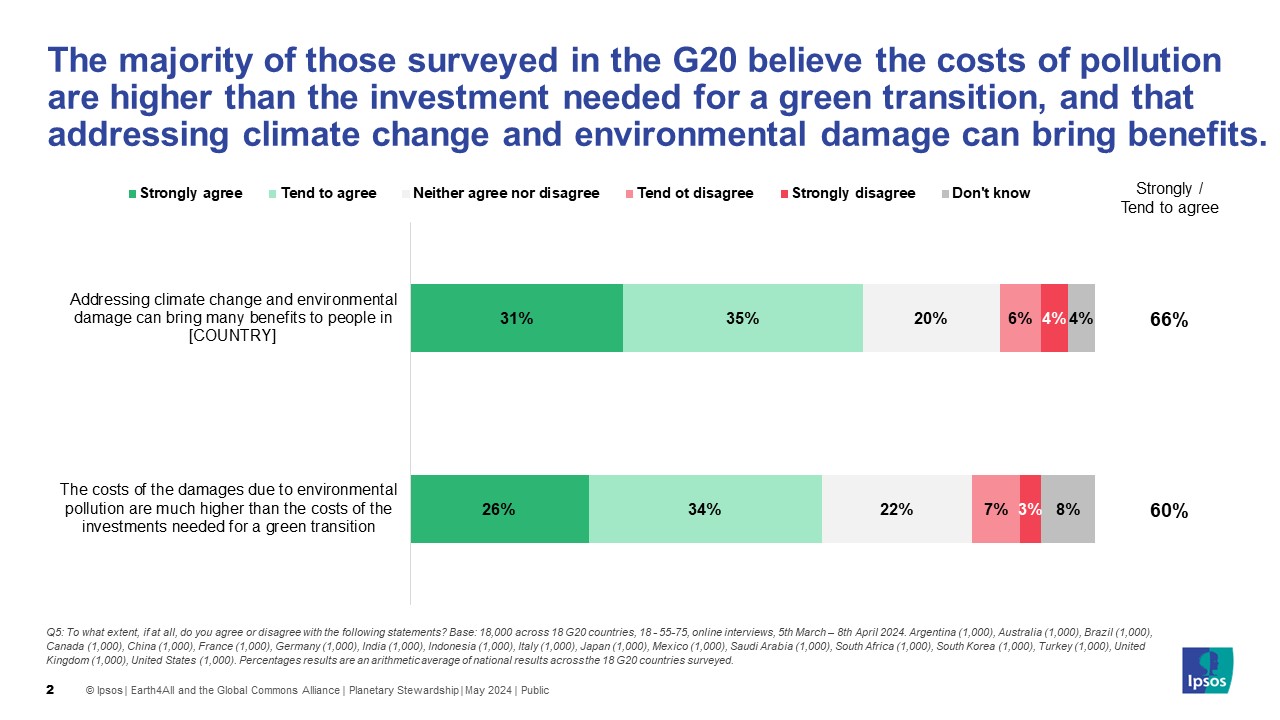Majority across the G20 are worried about the state of nature – but do not think their government is doing enough to tackle environmental damage
The Global Commons global survey ran across 22 countries (18 countries within the G20 (excluding Russia) plus Austria, Denmark, Kenya and Sweden) and measures attitudes to societal transformations, political/economic systems and planetary stewardship. In particular, the survey focused on: values and worldviews, attitudes towards nature and planetary stewardship, attitudes towards national and global political and economic systems and levels of support for Earth4All policy recommendations. This second report covers views on nature and planetary stewardship across the 18 G20 countries surveyed, while the findings on economic and political systems change from the Earth for All survey were released in June.
The findings are timely, being released ahead of New York Climate Week (22nd – 29th September), the UN Biodiversity COP15 in October 2024 and the G20 summit shortly after in November. They evidence a strong desire for more action to protect and restore nature to benefit people and planet.
- Concern for nature and awareness of the need for urgent action is high – while half feel exposed to climate change: Similar to the Global Commons Survey run in 2021, three in five across the G20 are extremely or very worried about the state of nature, both today (59%) and the state in which we will leave it for future generations (62%). Seven in ten (69%) agree that, because of human activities, the Earth is close to environmental tipping points where climate or nature may change suddenly or be more difficult to stabilise in future. A similar proportion (71%) believe the world needs to take action immediately (within the next decade) to reduce carbon emissions from electricity, transport, food, industry and buildings. At the same time, over half (52%) say they are either very or somewhat exposed to environmental and climate risks, while just three in ten (30%) agree that many of the claims about environmental threats are exaggerated.

- People across the G20 are less optimistic about the future of the world and nature: While most respondents are optimistic about their personal futures (62%), only 38% are optimistic about the future of the world. Three in five (59%) believe that nature is already too damaged to continue meeting humans’ needs in the long-term.
- Most see human and planetary health as connected, but people feel their government is not doing enough on climate: Three quarters (74%) agree that human health and wellbeing are closely connected to the health and wellbeing of nature, but only half (49%) believe nature can meet the needs of humans right now. Only a third (33%) feel their government is doing enough to tackle climate change and environmental damage. People are also sceptical about how far new technologies can solve environmental problems without individuals having to make big changes to their lives, with just 39% agreeing with this statement.
- The majority think the cost of damage from environmental pollution is higher than the cost of investment required for a green transition, and support criminalising actions likely to cause serious damage to nature and the climate: 72% of those surveyed in the G20 agree that it should be a criminal offence for leaders of large businesses or senior government officials to approve or permit actions they know are likely to cause damage to nature and climate that is widespread, long term or cannot be reversed. Three in five (60%) agree that the cost of damage due to environmental pollution is much higher than the cost of the investment needed for a green transition, while two thirds (66%) agree that addressing climate change and environmental damage can bring many benefits to people in their country.

Sophie Thompson, Research Manager at Ipsos said:
This survey highlights continuing concern across the G20 about the state of our planet, with half feeling personally exposed to environmental and climate risk. People feel we should be taking action to combat climate change and environmental damage and can see real tangible benefits to doing so, seeing a strong link between the health of nature with human health. However, only a third believe their government is currently doing enough to tackle climate change and environmental damage, while seven in ten would support criminalising activities likely to cause serious damage to nature and climate. This emphasises how much policymakers still need to do to deliver benefits for people and planet.
Technical note
- This research was commissioned by Earth4All and the Global Commons Alliance, in partnership with The Policy Institute Kings College, Wellbeing Alliance, ISWE and Wellbeing Economy Alliance.
- Data for this survey was collected through Ipsos i-Say Online Panel surveys run across 22 countries between 5th March and 8th April 2024. The sample for the survey overall was 22,000 adults aged 18 to 55-75. This included 18 G20 countries (Argentina (1,000), Australia (1,000), Brazil (1,000), Canada (1,000), China (1,000), France (1,000), Germany (1,000), India (1,000), Indonesia (1,000), Italy (1,000), Japan (1,000), Mexico (1,000), Saudi Arabia (1,000), South Africa (1,000), South Korea (1,000), Türkiye (1,000), United Kingdom (1,000), United States (1,000)), plus four countries outside the G20 (Austria (1,000), Denmark (1,000), Kenya (1,000) and Sweden (1,000)).
- Quota sampling was used and the data is weighted to be representative of the profile of the population in each country on age, gender, region and working status.
- The results presented here are the arithmetic average of national responses across the 18 G20 countries surveyed, where the results from each country have the same weight and are not pro-rata to the true population proportions for this audience. A sample of 18,000 people was gathered (or 17,000 in cases where questions were not asked in China).



